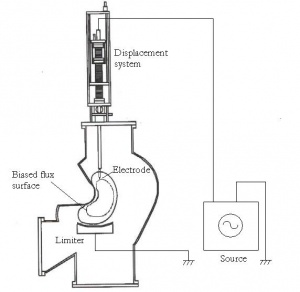TJ-II:Biasing probe: Difference between revisions
Jump to navigation
Jump to search
No edit summary |
No edit summary |
||
| Line 5: | Line 5: | ||
In 2009, the power source (originally DC) has been upgraded to allow modulation with a frequency of up to a few kHz. | In 2009, the power source (originally DC) has been upgraded to allow modulation with a frequency of up to a few kHz. | ||
Signal names in the [[TJ-II:Shot_database|TJ-II database]]: | |||
'PolI', 'PolV'. | |||
== References == | == References == | ||
<references /> | <references /> | ||
Revision as of 10:03, 19 August 2010

At TJ-II, a 2-D carbon composite mushroom shaped electrode (12 mm high with a diameter of 25 mm) has been developed and installed on a fast reciprocating probe drive. Typically, the electrode is inserted to a position 2 cm inside the last closed flux surface (LCFS) and biased positively (200-300 V) with respect to one of the two TJ-II limiters located in the scrape-off layer region (about 0.5 cm beyond the LCFS). Measured electrode currents are in the range of 30-50 A. [1] [2]
In 2009, the power source (originally DC) has been upgraded to allow modulation with a frequency of up to a few kHz.
Signal names in the TJ-II database: 'PolI', 'PolV'.